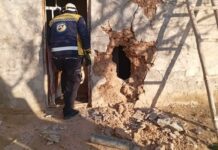
As Syria emerges from nearly 14 years of war, the deadly legacy of landmines, unexploded ordnance (UXO), and other remnants of conflict continues to threaten millions of civilians. Humanitarian organizations are warning of a looming crisis as efforts to remove these hazards remain insufficient, leaving vulnerable populations exposed to what experts have called “deferred death.”
The Human Toll
In just the past three weeks, 18 civilians, including seven children, have been killed by explosions from war remnants, according to the Syrian Civil Defense, also known as the White Helmets. A tragic example unfolded Sunday in the northern countryside of Daraa, where two children died, and two women were injured after a bomb detonated while the children were playing with it inside their home.
A day earlier, a landmine left by the former Syrian regime exploded in the eastern Hama countryside, killing six members of the same family, including three children, as their car passed near the village of Al-Rahjan.
The toll extends far beyond recent weeks. From March 2011 to April 2023, approximately 3,471 civilians lost their lives to explosive remnants of war, with thousands more injured, often suffering life-altering disabilities, according to the Syrian Network for Human Rights (SNHR).
International Action Needed
The Syrian Response Coordinators (SRC) team, a local humanitarian group, issued an urgent appeal Sunday for increased support to clear Syria of explosive hazards. They called for comprehensive plans to facilitate the safe return of displaced civilians, improved training and resources for mine-clearing teams, and expanded collaboration between local and international organizations.
“The spread of war remnants, including landmines and unexploded bombs, poses a significant danger to civilians,” the team said in a statement. “Delaying their removal will endanger millions of lives and worsen the suffering of Syrians.”
The team also reported that since the fall of the Assad regime earlier this month, at least 22 explosions have occurred, resulting in 200 deaths, including 63 children and four women. Eighteen children have also been seriously injured, many with permanent disabilities.
Gradual Progress Amidst Challenges
Efforts to remove war remnants have been slow and underfunded. The White Helmets conducted 203 removal operations and 32 surveys of dangerous areas between November 26 and December 5, neutralizing 493 explosive devices and identifying 80 minefields. Despite these efforts, such operations address only a fraction of the explosive hazards scattered across Syria.
The UN Office for the Coordination of Humanitarian Affairs (OCHA) estimates that half of Syria’s population is at risk from explosive hazards. Residential areas, farms, and roads remain littered with mines and unexploded ordnance, particularly in regions that saw heavy fighting during the war. “Humanitarian organizations must intensify their efforts, or we will continue to see tragedies like the recent deaths of children in Daraa,” said Razan Rashidi, director of the Syria Campaign.
Raising Awareness
The White Helmets have launched awareness campaigns in affected communities, urging residents to avoid abandoned military sites and suspicious objects. The group has produced cartoons, and posters and conducted field visits and presentations at schools to teach and warn children of the dangers posed by UXO. They have also called on civilians to report the presence of war remnants without attempting to move or touch them.
Humanitarian organizations, including the Euro-Mediterranean Human Rights Monitor, have called on local authorities to prioritize demining efforts in areas they control and to post clear warning signs in high-risk locations.
Experts warn that failure to address the crisis will hinder Syria’s recovery. “Mines and unexploded ordnance represent not only a physical danger but also an obstacle to rebuilding infrastructure, agriculture, and daily life,” said Chris Doyle, director of the Council for Arab-British Understanding.
International Responsibility
International cooperation is crucial to overcoming these challenges, humanitarian groups emphasize. The SRC called on the UN, donor countries, and NGOs to provide logistical, financial, and technical support to accelerate mine-clearing operations.
“Continued neglect of this issue will have disastrous consequences for Syria’s population,” the team said in their statement, emphasizing the need for urgent and sustained efforts to ensure a safe and stable future for Syrians and refugee returns. As the country rebuilds from the devastation of war, clearing Syria of explosive remnants is not just a humanitarian priority but a moral imperative to protect lives and enable the hope of millions for a safe return to their homes.








